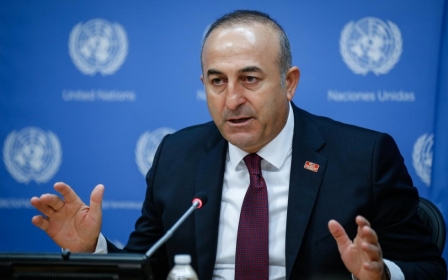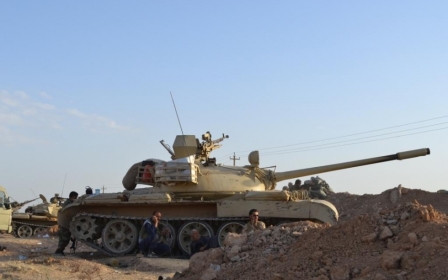In US war on IS, what would victory look like?

The United States has yet to explain exactly what victory might look like in its war against the Islamic State group, but it is becoming clear that success will depend heavily on political events in Syria and Iraq that are beyond its control, experts say.
The US strategy to "destroy" the IS militants is predicated on a series of high-stakes gambles that could take years to play out, particularly in Syria, where Washington is betting it can forge a dominant "moderate" rebel force.
Despite dramatic images of fighter jets bombing IS targets, President Barack Obama and his commanders have warned repeatedly that Americans should brace themselves for a years-long struggle and that the initial air raids will not produce miracles.
"I think this is going to be a generational challenge," Obama said this week.
The president and his deputies hope the US-led air strikes in Iraq and Syria will serve as a firewall against IS, buying time to build up local forces and fuel political momentum against the group.
"What our military operations can do is to just check and roll back these networks as they appear and make sure that the time and space is provided for a new way of doing things to begin to take root," Obama said.
Based on rough outlines offered by US officials, the war strategy is counting on defeating IS fighters first in Iraq through a combination of Kurdish forces, Iraqi army troops, Shiite militias and a "national guard" of Sunni tribes -- which does not yet exist.
Syrian rebel training could 'take years'
And in Syria, Washington is pinning its hopes on training and arming a new rebel army, at a rate of about 5,000 fighters a year.
At that pace, it will take about three years before the force is big enough to prevail against the IS group, according to the military's top officer, General Martin Dempsey.
Retired US general John Allen, who is leading the international effort against IS, said Wednesday that the training of Syrian rebels would be a slow process.
"It is going to take a while, it could take years, actually," Allen said in an interview with CNN. "We have to manage our expectations."
The US Congress has approved the training and equipping of moderate Syrian rebel units as part of an international plan to defeat IS.
Allen said the training of Syrian rebels was already under way.
"The process of getting that unfolded is occurring right now with the idea of locating training camps and beginning to accumulate the Syrian elements that will go into those training camps," he said.
The United States, which leads the international coalition, initially launched strikes in Iraq on August 8 and widened its campaign on September 23 to include Syria, where IS has its headquarters.
Allen said the international response has provided an opportunity for new partnerships.
"It's actually an important moment where so many countries from so many different backgrounds share that view, that this is an opportunity to create partnership across those lines of effort that can achieve real effect," he said.
US sees 'helpful' Iranian role
During the interview, Allen spoke about Iran's role in tackling IS fighters.
"We're not going to contemplate a bilateral coalition with Iran," he said, but went on to add that the Iranians "have a role to play, and where that role is helpful, we'll encourage it."
In Iraq, rolling back IS will hinge not on weapons or tactics but on the Shiite-led Baghdad government giving up its sectarian ways and reaching out to the country's alienated Sunni community, analysts said.
Much is riding on Iraq's new Prime Minister Haider al-Abadi, who has yet to signal a dramatic change, said Marina Ottoway, a senior scholar at the Woodrow Wilson Center.
"So far, the government has not taken any concrete decisions that could convince Sunnis and Kurds that their interests are now protected," Ottoway wrote in a new paper.
After the 2003 US invasion of Iraq, general David Petraeus, who later became commander there, famously quipped -- "Tell me how this ends."
The US administration is "recognizing that it is going to take a long time even in the best case scenario," Karl Mueller, senior political scientist at the RAND Corporation think tank, told AFP.
The plan to vanquish the IS militants at times appears uncertain about "how this ends," but that is partly because the Americans had to act quickly to stop a lightning advance by the militants, said Mueller.
US 'playing it by ear'
"The near term objective is to hold their (IS) advances and prevent the situation from getting worse," he said.
For the longer-term goal, the administration's strategy has an improvisational aspect, he said. "They are, to some extent, playing it by ear."
Despite a myriad of uncertainties, the IS group is not invincible and could be pushed into obscurity if it faced sustained pressure, particularly from Syrians and Iraqis opposed to its brutal ways, some experts said.
"If ISIL (IS) suffers big defeats in Iraq in the coming year, as I expect, their strength in Syria may suffer too," said Michael O'Hanlon of the Brookings Institution.
"Just because we can’t clearly see an end state shouldn’t preclude developing some allies and some leverage," said O'Hanlon, who has criticized Obama for not taking action sooner.
The outcome of the campaign will likely come down to politics in Iraq, Syria and among its neighbours, said Ottoway.
If the Iraqi government and Syrian opposition leaders fail to rise to the moment and shed their sectarian, ideological agendas, the US intervention will -- at best -- only slow the IS group's advance, she said.
As with US action in Iraq and Afghanistan over the past decade, she said, "a successful military intervention will be undermined by the hollowness of the political strategy."
New MEE newsletter: Jerusalem Dispatch
Sign up to get the latest insights and analysis on Israel-Palestine, alongside Turkey Unpacked and other MEE newsletters
Middle East Eye delivers independent and unrivalled coverage and analysis of the Middle East, North Africa and beyond. To learn more about republishing this content and the associated fees, please fill out this form. More about MEE can be found here.




